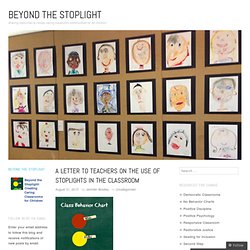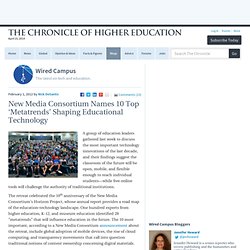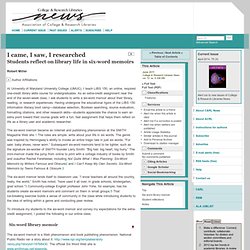

2014-nmc-horizon-report-he-EN-SC.pdf. Www.ideaedu.org/sites/default/files/paperidea_53.pdf. Www.wjh.harvard.edu/~lds/pdfs/DanaSpelke.pdf. How People Learn: Brain, Mind, Experience, and School: Expanded Edition. Game-Based Learning. A letter to teachers on the use of stoplights in the classroom. Dear Teacher, Before you hang that stoplight up for the new school year, please put yourself on red for a minute or two.

Rethink the idea that hanging a large paper traffic light in the front of the room, dotted with magnets or popsicle sticks displaying each student’s name is ok. Rethink the concept that publicly tracking behavior and doling out consequences based on whose behavior moves them off of green each day is fair, kind, or appropriate. Please rethink. I recognize myself in you. As a first year teacher, I remember ‘writing names on the board.’ I absolutely understand why you want it to work. We also know the predictable pattern the stoplight creates.
Or you could think about how it feels to be 5 or 6 or 7 years old and to worry daily about your name being moved from its perch on green. I know you can put a halt to it because I did, and it wasn’t even that difficult. So please leave that stoplight in the supply box. The school year is fresh and new. Rethinking the Design of PowerPoint. A small, but growing, revolution is occurring in the way that engineers and scientists design their presentation slides. This revolution advocates alternatives (based on multimedia learning principles) that challenge PowerPoint's default structure of a topic-phrase headline supported by a bullet list of subtopics. Rethinking scientific presentations: the assertion-evidence approach. One such alternative is the assertion-evidence structure, in which a sentence headline states the main message of the slide. That message assertion is then supported not by a bullet list, but by visual evidence: photos, drawings, diagrams, graphs, films, or equations.
Talks by Penn State undergraduates that demonstrate three important traits of effective presentation slides. Alabi. Checklist for Research Papers. Lesson Plan Map – Search Education – Google. Visuwords™ online graphical dictionary and thesaurus. The Blended Librarian - Resources.
New Media Consortium Names 10 Top 'Metatrends' Shaping Educational Technology - Wired Campus. A group of education leaders gathered last week to discuss the most important technology innovations of the last decade, and their findings suggest the classroom of the future will be open, mobile, and flexible enough to reach individual students—while free online tools will challenge the authority of traditional institutions.

The retreat celebrated the 10th anniversary of the New Media Consortium’s Horizon Project, whose annual report provides a road map of the education-technology landscape. One hundred experts from higher education, K-12, and museum education identified 28 “metatrends” that will influence education in the future. The 10 most important, according to a New Media Consortium announcement about the retreat, include global adoption of mobile devices, the rise of cloud computing, and transparency movements that call into question traditional notions of content ownership concerning digital materials. Apps - CLC Technology Conference 2011. I came, I saw, I researched.
Students reflect on library life in six-word memoirs Robert Miller + Author Affiliations At University of Maryland University College (UMUC), I teach LIBS 150, an online, required one-credit library skills course for undergraduates.

As an extra-credit assignment near the end of the seven-week class, I ask students to write a six-word memoir about their library, reading, or research experiences. Having undergone the educational rigors of the LIBS 150 information literacy boot camp—database selection, Boolean searching, source evaluation, formatting citations, and other research skills—students appreciate the chance to earn an extra point toward their course grade with a fun, fast assignment that helps them reflect on life as a library user and academic researcher. The six-word memoir became an Internet and publishing phenomenon at the SMITH Magazine Web site.1 The rules are simple: write about your life in six words. The six-word memoir lends itself to classroom use. Effective Teaching Strategies for the College Classroom.